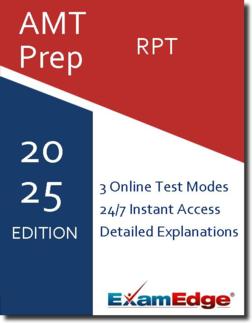AMT RPT (RPT) Practice Tests & Test Prep by Exam Edge - Topics
Based on 32 Reviews
- Real Exam Simulation: Timed questions and matching content build comfort for your AMT RPT test day.
- Instant, 24/7 Access: Web-based AMT Registered Phlebotomy Technician practice exams with no software needed.
- Clear Explanations: Step-by-step answers and explanations for your AMT exam to strengthen understanding.
- Boosted Confidence: Reduces anxiety and improves test-taking skills to ace your AMT Registered Phlebotomy Technician (RPT).

Understanding the exact breakdown of the AMT Registered Phlebotomy Technician test will help you know what to expect and how to most effectively prepare. The AMT Registered Phlebotomy Technician has multiple-choice questions The exam will be broken down into the sections below:
| AMT Registered Phlebotomy Technician Exam Blueprint | ||
|---|---|---|
| Domain Name | % | Number of Questions |
| Obtaining Blood Samples | 41.5% | 42 |
| Specimen Collection and Processing | 15.5% | 16 |
| Time Management and Assignment Organization | 8% | 8 |
| Professional Communications | 5.5% | 6 |
| Clerical Skills and Duties | 4.5% | 5 |
| Safety Standards and Procedures | 10% | 10 |
| Legal, Ethical, and Professional Considerations | 6% | 6 |
| Terminology, Anatomy, and Physiology | 9% | 9 |


